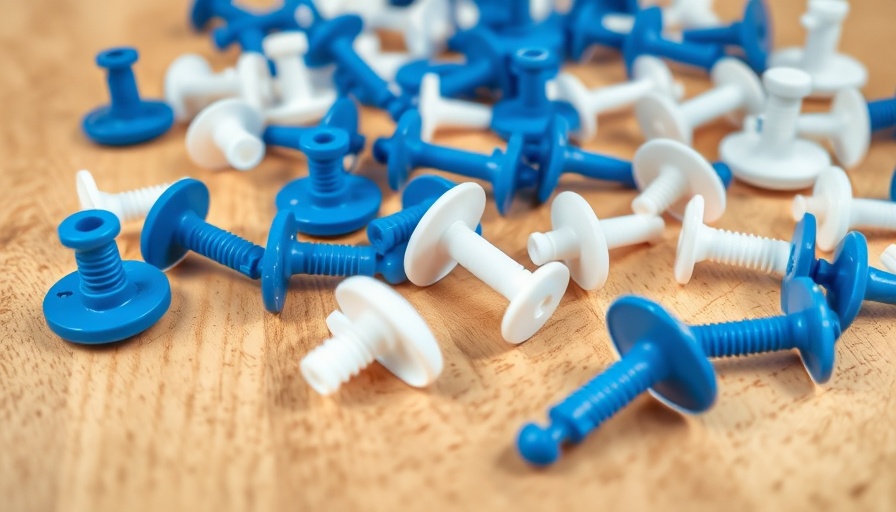
Understanding Drywall Anchors: The Basics
If you’ve ever hung a picture or mounted a shelf, you know that the right drywall anchor can make all the difference. Anchors are crucial for securing items to walls when studs are not readily accessible. Understanding the different types of anchors and their weight capacities is essential for any homeowner or do-it-yourselfer. From plastic expansion anchors to threaded options, knowing how much weight each can handle ensures that your projects are both safe and successful.
Types of Drywall Anchors: Which Is Right for You?
When it comes to drywall anchors, there's no one-size-fits-all. Here’s a closer look at the most common types of anchors and their unique advantages:
Plastic Expansion Anchors
These lightweight anchors are ideal for hanging lightweight items such as small pictures. They are easy to install and require minimal drilling. However, they are limited in weight capacity, typically holding between 5 to 25 pounds. If you're tackling a project where safety is key, keep in mind that over-tightening can cause these anchors to crack.
Molly Bolts: The Versatile Option
Molly bolts are designed for medium-duty applications, holding between 25 and 50 pounds. The unique folding design allows them to distribute weight over a larger area when tightened, making them more reliable than basic plastic anchors. Their ability to allow for screw removal and replacement without losing the anchor's grip also adds to their appeal.
Threaded Drywall Anchors: Strength Meets Ease
For heavier items, threaded drywall anchors (up to 75 pounds) are a go-to choice. They screw directly into the drywall without the need for pre-drilling, simplifying the installation process. Their robust design offers a greater holding capacity, making them ideal for mounting TVs or other sizable objects.
Know Your Weight Limits: A Critical Safety Measure
When choosing any drywall anchor, a general rule is to select an anchor rated for at least 25% more weight than the item you are hanging. This buffer is crucial, especially for heavier items that can present hazards if improperly secured. For example, if you're hanging a mirror that weighs 10 pounds, opt for an anchor rated to hold at least 12-15 pounds.
Common Mistakes to Avoid When Using Drywall Anchors
Even seasoned DIYers can fall victim to a few common mistakes:
- Choosing the Wrong Anchor Type: Not all anchors are suited for every application. Ensure you match your anchor to the weight and type of item you wish to hang.
- Incorrect Installation: Over-tightening can lead to damage while under-tightening can result in failure. Always follow the manufacturer’s instructions carefully.
- Ignoring Wall Conditions: Assess the wall for conditions that could affect the anchor’s holding, like moisture or damage. Ensure that your wall is solid and ready for the installation.
Practical Tips for Successful Anchor Installation
Here are a few expert tips to enhance your DIY experience and ensure safety:
- Use a Level: Always use a level to ensure your items are hung straight, saving you the hassle of adjustments later.
- Consider the Wall Type: Different wall materials may require specific anchors. For example, use concrete screws for concrete walls.
- Test Before You Trust: After hanging an item, gently pull downward to check the anchor's security before relying on it fully.
The It Factor: Why Choosing the Right Anchor Matters
Choosing the right drywall anchor impacts not just the durability of your mounting, but your safety as well. Properly installed fixtures reduce risks of falling objects, protect your walls from damage, and help maintain your home’s aesthetics. Whether it's a simple picture frame or a hefty television, understanding anchors allows you to tackle projects confidently and efficiently.
Take Action with Confidence: Your DIY Future Awaits!
Now that you’re armed with knowledge about drywall anchors, it’s time to put your skills to the test. Whether it’s hanging shelves in your living room or securing a television in your entertainment setup, understanding your tools empowers you to refine your home maintenance capabilities. Dive into your next DIY project with confidence, knowing you can choose the right anchor for the task at hand!
 Add Row
Add Row  Add
Add 



 Add Row
Add Row  Add
Add 


Write A Comment